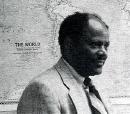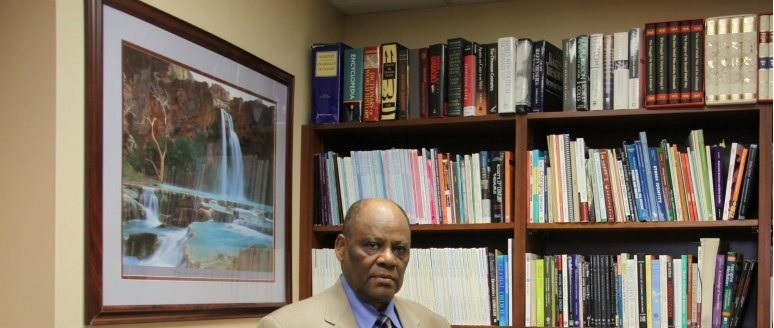

latest events
There was another historic event that cemented my faith in the Oromo people and their belief in their Oromummaa. Between 2001 and 2004, I was privileged to serve on the Shanachaa Jaarsmumaa Peace Mission. As the Chairman of the Shanachaa, I was exposed to various views expressed by the Oromo people around the world. Other members also had their contacts too. At the end of the process we made three fundamental observations. First, the Oromo people believe in unity. Second, the Oromo people support the OLF. Third, the Oromo people want to support the goal of self-determination (independence). This is true manifestation of Oromummaa.. read more

welcome to Hamdesatuso.com
Dr. Hamdesa Tuso was born and raised in Oromia in the Ethiopian Empire. He advocated for social change as a youth mobilizing with landless peasants in the quest for justice. These life lessons in indigenous forms of human rights advocacy and peacemaking remain at the core of his work. His life journey has led him to pursue higher education Australia and North America. He attended Avondale College, NSW, Australia, receiving a B.A. He subsequently pursued his graduate education at Andrews University, Berrien Springs, Michigan where he received his M. A. and Michigan State University where he obtained his Ph.D.
Dr. Tuso practices his concentration on conflict resolution within and beyond the academy. As a faculty member of the Department of Peace and Conflict Studies, University of Manitoba, he teaches and supervises graduate students. During the last three decades he has written numerous scholarly works on ethnic conflict in the Horn of Africa, also on indigenous processes of peacemaking. He has lectured at ten major universities in North America and Australia (by invitation) on the subject of human rights violations and refugee crisis in Africa. Most recently, he is involved, with his colleagues, in new research and publication on the subjects of Peace on Earth: The Role of Religion in Peacemaking, Gender and Peace Building: All hands are Required. He served as the lead editor for the book Creating the Third Force: Indigenous Processes of Peacemaking. He simultaneously applies his expertise in an array of indigenous and adapted forms of peacemaking to advocate for resolution of conflicts in cross-cultural settings. During the first eight years of his career, he served as an administrator of international programs (the first five years as the Chief International Advisor, and three years as the Director of the Office of International Programs and Services) at George Mason University. During those adventurous years, in addition to his normal office duties, he developed major cross-cultural programs (e. g. International Week, International Coffee Hour), which brought together diverse communities in the newly emerging major suburbia university in Northern Virginia.
He was instrumental in forming the Shanachaa Jaarsummaa (five-member peacemaking body) to resolve the 10 year-old conflict within the leadership of the Oromo Liberation Front (OLF). He has similarly participated in the evolution of five other diverse organizations ranging from refugee support units to a scholarly society in the Horn of Africa. Also, during the 1980s, he served on the Board of Directors of Immigration and Refuge Forum (about 120 organizational member entity) where he worked with the leaders of the coalition of new immigrant and refugee communities in the U. S. The vigorous campaign of that coalition and lobbying led to the historic Immigration Reform Act of 1986, which was passed by the U. S. Congress and was signed by President Ronald Regan.
The legacy of his hands-on work including as an invited participant in the London Peace Conference of May 1991 which charted the political system in post-Dergue (military junta) Ethiopia has imbued his scholarly contributions with a blend of practical and theoretical knowledge. His academic appointments with George Mason University, Nova Southeastern University, Menno Simons College of the University of Winnipeg, among others has led him to dedicate his life to embedding indigenous and other practiced forms of expertise with conventional scholarship thereby maximizing the lessons he learned as a scholarly advocate for peace and justice. In addition to his teaching load in these universities, Dr. Tuso has formed scholarly organizations such as Oromo Studies Association (OSA), the African Working Group (AWG).
Prof Hamdesa Tuso CV April 2020
Courses Taught
Department of Peace and Conflict Studies
Faculty of Graduate Studies
The University of Manitoba
252C-70 Dysart Rd.
Winnipeg, Canada R3T 2M6
Course Taught at University of Manitoba
Graduate Level
PEACE 7050: Culture and Conflict
PEACE 7240: Indigenous Processes of Peacemaking
PECAE 7110: International Human Rights and Human Security
PEACE 7060: Social Basis of Terrorism
Courses Taught at Menno Simons College, the University of Winnipeg
Undergraduate Level
CRS-2281/3-002: Social Basis of Terrorism
CRS-2241/3-001: Culture and Conflict
CRS-2210/3-001: Theories of Social Conflict
Prof Hamdesa Tuso CV April 2020